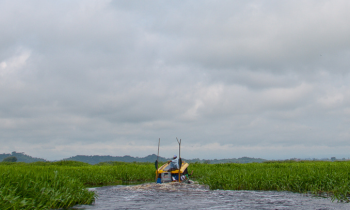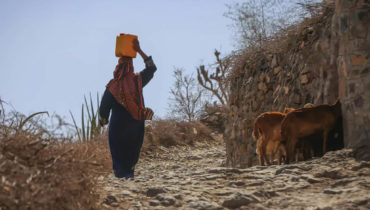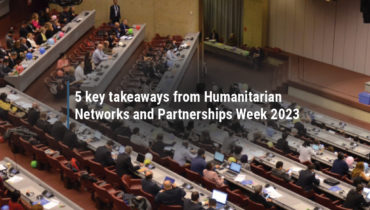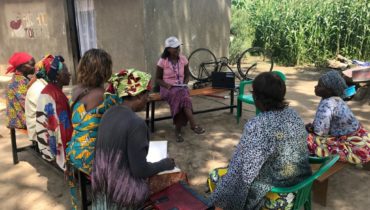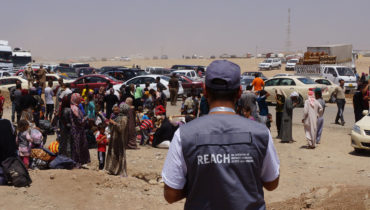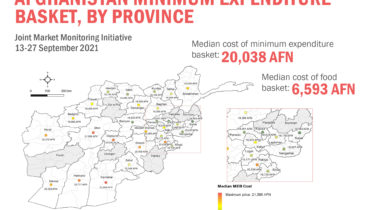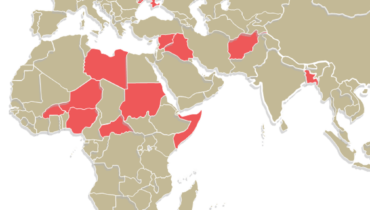Global Refugee Forum 2023: IMPACT’s pledges on key issues facing refugees globally
13 December 2023
The Global Refugee Forum is taking place this week, and IMPACT will be present for these discussions. Held every four years, this event is the largest international gathering on refugees globally, and is intended to support the practical implementation of the Global Compact on Refugees (GCR).
Ahead of the Forum, IMPACT contributed two pledges related to implementation of the GCR. These pledges address the following objectives:
- Advancing localisation in displacement and statelessness responses
- Economic inclusion and social protection
- Climate action and finance
- Climate resilient sustainable human settlements for refugees and their hosting communities
Read them below or alongside others on the GCR Pledges & Contributions page.
Contributed by IMPACT
At IMPACT, we pledge to leverage our expertise in data collection and analysis in humanitarian contexts to inform policies and responses addressing the multifaceted challenges faced by refugees and displaced populations. Our commitment is threefold: encompassing economic inclusion and social protection, climate action, and the advancement of localisation. By combining rigorous data gathering with in-depth analytical insights, we aim to inform need-based assistance and foster people-centred responses for these vulnerable groups.
Aligned with the multi-stakeholder pledge on economic inclusion and social protection, IMPACT is committed to deploying its expertise in data collection and analysis to enhance the economic opportunities and social protection mechanisms for refugees, other displaced populations and host communities. Utilizing and adapting our established methodologies – the Multi-Sector Needs Assessment (MSNA), Area-Based Assessment (ABA), and Longitudinal Survey (LS) – IMPACT aims to provide nuanced insights that can inform the development of strategies and responses focused on self-reliance and local integration.
In line with the climate action pledge, IMPACT will be employing its assessment tools to identify and generate evidence on hazard’s impact and climate-related vulnerabilities of refugees, other displaced populations and host communities. Understanding the urgency of climate resilience, IMPACT is committed to providing comprehensive data that improves the understanding of the specific needs and capacity gaps of refugees, forcibly displaced and host populations to prepare and respond to climate impacts and that informs decision-making in risk reduction, resilience-building and climate adaptation. This commitment includes contributing at the global level to the development of refined guidance and research approaches, specifically focusing on integrating disaster risk, climate, and environmental considerations into settlement-based approaches – which are critical in displaced and refugee hosting settlements. This effort is part of our active involvement in the Urban Settlements Working Group of the Global Shelter Cluster. Our goal is to inform humanitarian and development planning and policies that can enhance the resilience of these communities to environmental challenges, ensuring that they are equipped to face the impacts of climate change effectively, sustainably and timely.
Echoing the pledge to advance localisation, IMPACT will support and empower local governments and communities through participatory tools and assessments, including the development of local recovery and development plans. These plans serve to inform and guide local decision-making, taking into account the often overlooked needs and protection situation of refugees living outside of camp settings and building the capacities of local governance actors to integrate refugees into local development strategies. By doing so, we aim to enable local actors to build resilient communities that are well-equipped to address and respond to humanitarian and development challenges independently, and with the capacity to integrate refugees in local development strategies.
MSNAs – a yearly crisis-wide representative assessment – inform Humanitarian Needs Overviews (HNOs) and Humanitarian Response Plans (HRPs). It offers detailed understanding of the needs and vulnerabilities faced by forcibly displaced populations and host communities. By systematically measuring and analysing refugee population levels of economic inclusion, social protection and climate-related vulnerabilities IMPACT will enable National Authorities, UN Agencies, INGOs, and local Civil Society Organisations to develop responsive and context-specific strategies that support economic integration and enhance self-reliance among these populations.
Area-Based Assessments offer localized, in-depth insights into the unique challenges and opportunities within specific settlements and areas. These assessments, adaptable to various contexts, provide crucial data for informed decision-making in the realms of basic services planning, economic inclusion, social protection, and climate action. By comprehensively analysing the needs and dynamics of certain communities and taking into account the socio-spatial realties of basic services, urban settlements infrastructure and governance, ABAs inform local authorities, civil society and organizations to develop targeted and effective strategies. This approach ensures that interventions are not only relevant but also sustainable, contributing to the goals of economic integration, resilience building, and enhancing self-reliance among displaced populations and host communities.
The Longitudinal Survey methodology offers a dynamic and ongoing perspective on the challenges and opportunities faced by displaced populations and host communities. This approach is particularly effective in tracking changes over time, providing data on the population’s changes in economic inclusion and social protection, as well as climate action. By regularly monitoring the evolving conditions of these communities, the Longitudinal Survey enables a better understanding of the long-term impacts of interventions and policies, the evolution of needs and vulnerabilities, the integration of the displaced population and the pathways towards durable solutions.
Employing the most suited methodology for each context, IMPACT will conduct assessments tailored to understanding the economic, social, and climate-related challenges faced by refugees, other displaced populations and host communities. These assessments will serve to inform and enable responses that effectively address the complexities of displacement and promote durable solutions.
Contributed by AGORA (joint initiative of IMPACT and ACTED)
In the coming four years, Acted and IMPACT Initiatives pledge to work towards achieving the fundamental rights of refugees and other displacement affected populations, as well as climate resilience and sustainability, by fostering durable solutions for displaced persons in crises affected human settlements, supporting exit strategies from humanitarian responses in displacement crises where Acted and IMPACT are present.
To this end, we will deploy wherever possible our AGORA area-based, participatory, and multi-stakeholder methodology to work with refugee and internally displaced populations, communities hosting them and local governance actors to generate and act upon a shared understanding of the challenges facing displacement affected populations, especially in urban contexts.
AGORA is an evidence-based approach anchored in local territories and knowledge to better support people in protracted crisis. It puts displacement affected people at the centre of program design and promotes sustainable living conditions for all in refugee and IDP hosting settlements, particularly in urban areas. The AGORA approach starts by identifying areas hosting larger than normal number of refugees and vulnerable host communities and where displacement is protracted. These territories serve as the basis for research, participatory planning, delivery and coordination to ensure that refugees, IDPs, host communities and local governments have a role to play in prioritizing needs, defining interventions.
Guided by an age, gender and diversity and inclusive approach and building on sound research methodologies, the approach captures the challenges that displacement affected communities are facing and their interlinkages between climate risks, access to land and basic services, in parallel to an analysis of services and existing policies in place at the level of each city and town. This analysis of the needs and intentions of affected populations are tailored to the specificities of the local context of each displacement affected settlement, building on local knowledge, environmental assessments and policy analysis.
Translating information into planning, this evidence is shared back to local decision-makers to support them in identifying opportunities to invest in the sustainable and equitable development of displacement affected settlements alike, through participative processes. Climate-smart, relevant local priorities across the eight durable solutions criteria are identified, planned and where feasible implemented by local governance actors, refugee organizations and host communities themselves.
Our response to these priorities will start with needs-driven immediate relief and transition towards longer-term, locally-owned development and social cohesion programs designed to foster durable solutions, strengthening resilience to climate risks and sustainable human settlements across all sectors. This can include WASH, shelter, education, essential relief items, as well as longer term infrastructure, rural or urban livelihood support through climate smart and nature-based solutions, improved natural resource management, as well as small business development. Further, implementing capacity strengthening for local actors including civil society and governance stakeholders will help ensure a sustainable response after we exit. We will also complement our own support to locally identified solutions by helping local actors mobilize external actors with resources and capacities to support implementation. Finally, we will endeavour to systematically connect local solutions and lessons to inform higher level durable solutions and displacement relevant policy frameworks and discussions.


